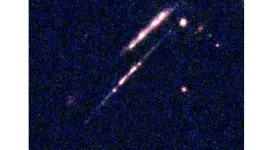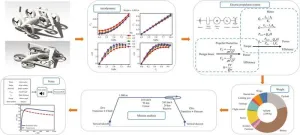(Press-News.org) Researchers compared patients who received care remotely to those who got ultrasounds and found no differences in outcomes.
Medication abortion patients who receive pills by mail without first getting an ultrasound do just as well as those who are examined and given the drugs in person, new research from UC San Francisco has found.
The study, which appears June 24 in JAMA, adds to evidence from UCSF’s Advancing New Standards in Reproductive Health (ANSIRH) program that using telehealth for medication abortion is safe and effective.
Although the Supreme Court recently upheld the Food and Drug Administration (FDA) guidelines that permit remote prescribing and delivery of medication abortion, it was a narrow ruling based on the plaintiffs not having the standing to sue.
These guidelines have enabled the provision of medication abortion via telehealth, which has improved access to care in recent years. More legal challenges to medication abortion are expected in the wake of the narrow ruling.
After the high court ended the constitutional right to abortion in 2022, a growing number of states enacted restrictions; and medication abortion now accounts for about two-thirds of all abortions in the U.S. healthcare system.
“This study adds to a growing and robust body of evidence demonstrating the effectiveness and safety of medication abortion with telehealth and mailing medications,” said Lauren J. Ralph, PhD, MPH, an associate professor of obstetrics, gynecology and reproductive sciences at UCSF and first author of the study.
“Patient history-based models of medication abortion care without ultrasound and via telehealth offer a safe, effective and urgently needed way to overcome logistical and geographic obstacles to accessing abortion today,” she said.
Testing the “no test” method
The researchers analyzed the experiences of 585 patients at clinics in Colorado, Illinois, Maryland, Minnesota, Virginia and Washington from May 2021 to March 2023, dividing them into three groups.
The first were evaluated for eligibility for medication abortion using telehealth. They underwent a patient history-based screening without ultrasound, also known as the “no-test” method, and received their medication by mail (288 patients). The second were assessed using the “no-test” method and received their medication in person (119 patients). And the third underwent an ultrasound and got their medication in person (238 patients).
All participants took the two-drug regimen of mifepristone, which blocks progesterone, a hormone that is needed to continue pregnancy, and misoprostol, which is used one to two days later to bring on contractions. The safety of mifepristone, the only drug approved by the Food and Drug Administration (FDA) specifically for medication abortion, has been at the center of the Supreme Court case.
The researchers found that 95% of the participants had a complete abortion without having to repeat the regimen, and the telehealth patients did as well as those who received in-person care. Serious adverse events were rare regardless of the group.
Medication abortion is approved for use in people up to 10 weeks (70 days) of pregnancy. And Ralph said patients can report enough information about their history to assess how far along they are in pregnancy without an ultrasound.
“These models of care that rely on no-test telehealth screening and mailing medications are as effective as in-person care with ultrasound and should be offered to all pregnant people,” she said.
Research confirms that restrictions were not necessary
The recent Supreme Court case sought to roll back guidelines that have made the medication more widely available, including the FDA’s removal in 2021 of a requirement that mifepristone be dispensed in person at a clinic or doctor’s office.
In February, UCSF researchers showed that medication abortion can be delivered safely and effectively through telehealth. And in May, they published a study that found dispensing the pills through the mail works as well as requiring patients to pick them up in person.
“The science is clear that telehealth evaluation and pharmacy dispensing of abortion pills is safe and effective,” said ANSIRH’s director, Daniel Grossman, MD, a UCSF professor of obstetrics, gynecology and reproductive sciences and senior author of the latest study. “Any attempt to restrict it is not based on science.”
Authors: Additional UCSF authors include C. Finley Baba, MPH, and M. Antonia Biggs, PhD.
Funding: The study was supported by grants from the DeMartini Foundation and The Susan Thompson Buffett Foundation.
About ANSIRH: Advancing New Standards in Reproductive Health (ANSIRH), based at the University of California, San Francisco, conducts rigorous scientific research on complex issues related to reproductive health in the United States and internationally. ANSIRH provides much-needed evidence for active policy debates and legal battles around reproductive health issues. To learn more, please visit www.ansirh.org.
About UCSF: The University of California, San Francisco (UCSF) is exclusively focused on the health sciences and is dedicated to promoting health worldwide through advanced biomedical research, graduate-level education in the life sciences and health professions, and excellence in patient care. UCSF Health, which serves as UCSF's primary academic medical center, includes top-ranked specialty hospitals and other clinical programs, and has affiliations throughout the Bay Area. UCSF School of Medicine also has a regional campus in Fresno. Learn more at ucsf.edu, or see our Fact Sheet.
###
Follow UCSF
ucsf.edu | Facebook.com/ucsf | YouTube.com/ucsf
END
New study shows medication abortion without ultrasound to be safe
2024-06-24
ELSE PRESS RELEASES FROM THIS DATE:
New approach accurately identifies medications most toxic to the liver
2024-06-24
The current method for assessing medication-related liver injury is not providing an accurate picture of some medications’ toxicity—or lack thereof—to the liver, according to a new study led by researchers from the Perelman School of Medicine at the University of Pennsylvania. Classification of a medication’s potential to damage the liver, termed “hepatotoxicity,” has been historically determined by counting individual reported cases of acute liver injury (ALI). Instead, the researchers used real-world health care data to measure rates of ALI within a population and uncovered that some medications’ levels of danger to the liver ...
Study reveals new opportunities to develop cancer treatments
2024-06-24
Researchers at Baylor College of Medicine and collaborating institutions have uncovered new potential therapeutic targets for cancer and new insights into existing cancer drug targets, expanding the breadth of possibilities for treating this disease. Using a comprehensive approach that included integrating proteomics, genomics and epigenomics data from 10 cancer types, the team identified protein and small protein or peptide targets in cancer tissues and validated many of them experimentally as promising candidates for therapeutic strategies. The study appeared in Cell.
“Experience ...
Bezos Center for Sustainable Protein launches at Imperial with $30M funding
2024-06-24
Bezos Earth Fund grant establishes new Centre at Imperial to transform global food systems from environmentally damaging to innovative by creating sustainable solutions.
Imperial’s Bezos Centre for Sustainable Protein, launched today, will develop innovative and evidence-based solutions through the design, delivery, and commercialisation of alternative food products that are economically and environmentally friendly, nutritious, affordable, and tasty.
The Centre, spanning across seven Imperial academic departments, will advance research into precision fermentation, cultivated meat, bioprocessing and automation, ...
Star clusters observed within a galaxy in the early Universe for the first time
2024-06-24
The history of how stars and galaxies came to be and evolved into the present day remains among the most challenging astrophysical questions to solve yet, but new research brings us closer to understanding it.
In a new study by an international team led by Dr. Angela Adamo at Stockholm University, new insights about young galaxies during the Epoch of Reionization have been revealed. Observations with the James Webb Space Telescope (JWST) of the galaxy Cosmic Gems arc (SPT0615-JD) have confirmed that the light of the galaxy was emitted 460 million years after ...
How much oxygen do very premature babies need after birth?
2024-06-24
Giving very premature babies high concentrations of oxygen soon after birth may reduce the risk of death by 50 percent, compared to lower levels of oxygen says new research led by University of Sydney researchers.
When premature babies are born, they sometimes need help breathing because their lungs haven’t finished developing. To help babies during this process, doctors may give them extra oxygen through a breathing mask or breathing tube.
The study, published in JAMA Pediatrics, examined clinical trial data and outcomes of ...
Trial offers hope for cheaper, more tolerable, ketamine treatment
2024-06-24
For those suffering from treatment-resistant depression, the anaesthetic drug ketamine offers hope, but it has side effects and can be costly to access – a University of Otago-led clinical trial may change that.
Working in collaboration with New Zealand’s Douglas Pharmaceuticals, researchers have conducted a trial of ketamine in an extended-release tablet form.
The study, published in prestigious international journal Nature Medicine, involved 168 adults for whom regular anti-depressant therapy ...
Fertility treatments could get boost from stem cells
2024-06-24
An unexpectedly versatile and regenerative stem cell in early embryos may be key to creating new effective fertility treatments, suggests a new study in mice from the University of Copenhagen.
It probably will not surprise anyone that pregnancy is a very complicated process. First, a sperm cell must find its way and fertilize an egg in the fallopian tube, after which the egg begins to divide. After about five days, the egg becomes a blastocyst, which eventually develops into a fetus.
But for more and more people, fertility is becoming increasingly harder to achieve due to various factors ...
Ketamine slow-release tablet reduces symptoms of severe depression: Clinical trial
2024-06-24
A new tablet form of ketamine has shown promise in treating severe depression, offering a potential alternative to existing clinic-based treatments that can be expensive and lacking in convenience for some patients.
Unlike the injectable and nasal spray alternatives that require clinicians to monitor patients for two hours while side effects subside, the slow-release tablet form can be taken safely at home without medical supervision and with negligible side effects.
Led by Professor Paul Glue of University of Otago, researchers from UNSW Sydney and the affiliated Black Dog Institute (BDI) collaborated with colleagues from ...
The future takes flight: Autonomous eVTOLs transforming air mobility
2024-06-24
In recent years, a new era of transportation innovation has unfolded with the introduction of autonomous electric vertical take-off and landing (eVTOL) aircrafts. These advanced air mobility (AAM) systems are poised to revolutionize urban and regional transportation by offering efficient, sustainable, and rapid transit solutions, potentially transforming daily commutes and cargo deliveries alike.
eVTOL technology, which enables aircrafts to ascend, hover, and land vertically, has become a focus for both academic research and commercial ventures due to its numerous advantages ...
One bad apple spoils the barrel: New study uncovers multiple molecular subgroups in liver cancer with most aggressive driving clinical outcomes
2024-06-24
Singapore, 24 June 2024 – A study led by clinician-scientists and scientists from the National Cancer Centre Singapore (NCCS) and A*STAR’s Genome Institute of Singapore (GIS) and funded by the National Research Foundation Singapore (NRF) has discovered unexpected molecular heterogeneity even within the same liver tumours. More than 40% of HCC harbours more than one molecular subtype within the same tumour and in these, the clinical outcomes for the patients are best predicted by the most aggressive subtype. This phenomenon, termed the “bad apple effect”, has significant implications on the understanding of liver cancer and suggests that a more holistic sampling ...


